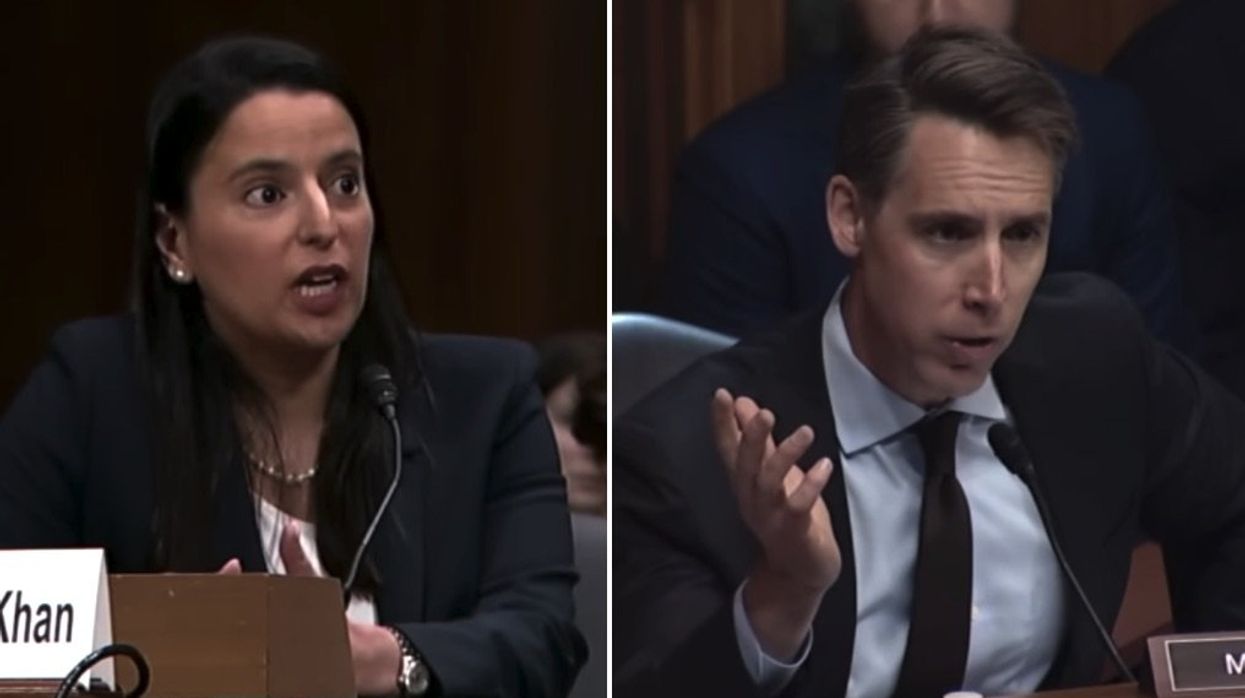
Image source: YouTube screenshot

Sen. Josh Hawley (R-Mo.) dressed down a Biden judicial nominee on Wednesday for defending COVID-19 pandemic policies that discriminated against religious liberty.
Before serving on the D.C. Court of Appeals, Judge Loren AliKhan served Washington, D.C., as its solicitor general. So when Capitol Hill Baptist Church sued D.C. Mayor Muriel Bowser in 2020 for religious discrimination — arguing that Bowser kept church gatherings shut down to protect public health while encouraging mass protests for racial justice — AliKhan defended the city in court.
Ultimately, a federal judge ruled in Capitol Hill Baptist's favor, finding the city was violating the church's rights. The city did not appeal, essentially admitting defeat.
On Wednesday, Hawley confronted AliKhan — a federal district court nominee — about her defense of Bowser's discriminatory policies. But it was clear AliKhan did not want to broach the case.
The Republican senator asked AliKhan why she lost the case in court. She responded by repeatedly invoking what Hawley condemned as "legalese." Specifically, AliKhan said she lost the case because the court determined that "the restrictions did not meet the standard of strict scrutiny," which really means the D.C. government could not prove a compelling state interest for the restrictions.
"Meaning they were unconstitutional?" Hawley, knowing the answer, asked.
"Meaning that they did not survive strict scrutiny and it’s a matter of public record that the District of Columbia did not appeal that decision," she responded.
"Why, why, why were they struck down?" the senator pressed. "Why were the restrictions that you defended struck down as discriminatory?"
"Because they did not satisfy—" AliKhan began when Hawley interjected.
"Why didn't they?" he asked again.
"The court concluded that there were restrictions that were not neutral of general applicability—" she tried to say when Hawley interrupted again.
"Yeah, yeah, yeah, yeah that's legalese. Why didn't they? Why didn't they on the facts? You know the facts, you're a good lawyer. Why'd you lose?" he asked again.
"We lost because applying the strict-scrutiny test, the court concluded that the restrictions were not narrowly tailored to serve a compelling governmental interest," AliKhan admitted.
"Because?" Hawley pressed again.
Hawley's insistence in trying to get AliKhan to say for herself in layman's terms why she lost the case left her without words. Hawley finally answered the question himself.
"Oh, come on, Judge, don't make me do this. Do you want me to go through it for you? You lost this because Mayor Bowser was going to mass protests, herself personally, with thousands of people," Hawley explained. "At the same time she was doing that, she was prohibiting churches, religious people, from gathering socially-distanced outside, wearing masks, and the district court said, 'You can't do that, that's discrimination.'"
Sen. Hawley Grills Biden Judicial Nominee Who Defended D.C. Church Closures During COVIDwww.youtube.com
After some back-and-forth, Hawley turned to a specific argument that AliKhan made in defending D.C.'s lockdown policies.
"Why did you argue that religious services, religious people pose a greater risk of an infection than people gathered to argue for defunding the police?" he asked.
"I was representing my client," she excused. "The mayor, in consulting epidemiologists, had issued orders that she thought were going to protect public health. It was my role to defend those."
"But why'd you make that argument?" Hawley pressed.
"My understanding was the nature of singing and other things epidemiologists thought could transmit COVID at a higher rate," AliKhan said.
But Hawley pointed out that AliKhan included no "scientific evidence" in her argument. She excused herself by claiming "those were fast-moving cases."
"That's not what the district court said," Hawley shot back. "The district court said that your client engaged in and you defended discrimination on the basis of religious belief, that you offered no scientific evidence for, that you pressed these arguments over and over and over without any foundation."
Hawley told AliKhan that he would not support her nomination because she defended her argument in the hearing instead of owning up to the discriminatory premise on which it was built.
Like Blaze News? Bypass the censors, sign up for our newsletters, and get stories like this direct to your inbox. Sign up here!